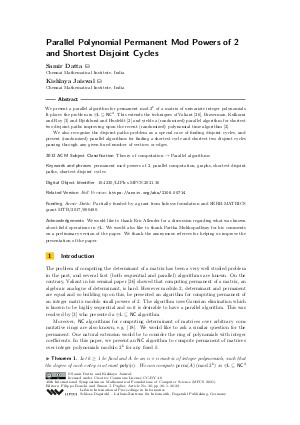@InProceedings{datta_et_al:LIPIcs.MFCS.2021.36,
author = {Datta, Samir and Jaiswal, Kishlaya},
title = {{Parallel Polynomial Permanent Mod Powers of 2 and Shortest Disjoint Cycles}},
booktitle = {46th International Symposium on Mathematical Foundations of Computer Science (MFCS 2021)},
pages = {36:1--36:22},
series = {Leibniz International Proceedings in Informatics (LIPIcs)},
ISBN = {978-3-95977-201-3},
ISSN = {1868-8969},
year = {2021},
volume = {202},
editor = {Bonchi, Filippo and Puglisi, Simon J.},
publisher = {Schloss Dagstuhl -- Leibniz-Zentrum f{\"u}r Informatik},
address = {Dagstuhl, Germany},
URL = {https://drops.dagstuhl.de/entities/document/10.4230/LIPIcs.MFCS.2021.36},
URN = {urn:nbn:de:0030-drops-144763},
doi = {10.4230/LIPIcs.MFCS.2021.36},
annote = {Keywords: permanent mod powers of 2, parallel computation, graphs, shortest disjoint paths, shortest disjoint cycles}
}

 Creative Commons Attribution 4.0 International license
Creative Commons Attribution 4.0 International license


